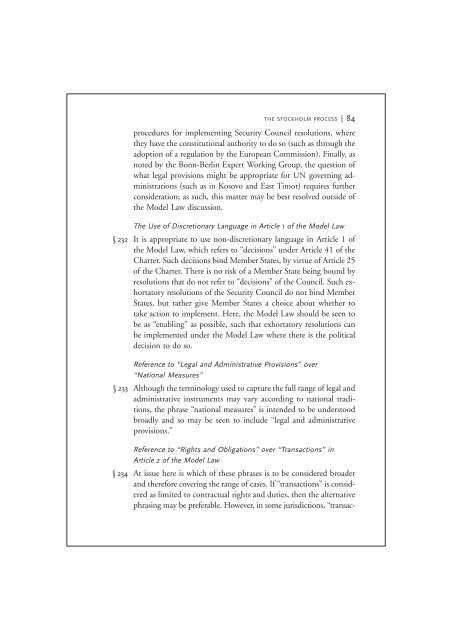Making Targeted Sanctions Effective - Small Arms Survey
Making Targeted Sanctions Effective - Small Arms Survey
Making Targeted Sanctions Effective - Small Arms Survey
Create successful ePaper yourself
Turn your PDF publications into a flip-book with our unique Google optimized e-Paper software.
THE STOCKHOLM PROCESS | 84<br />
procedures for implementing Security Council resolutions, where<br />
they have the constitutional authority to do so (such as through the<br />
adoption of a regulation by the European Commission). Finally, as<br />
noted by the Bonn-Berlin Expert Working Group, the question of<br />
what legal provisions might be appropriate for UN governing administrations<br />
(such as in Kosovo and East Timor) requires further<br />
consideration; as such, this matter may be best resolved outside of<br />
the Model Law discussion.<br />
§ 232<br />
§ 233<br />
The Use of Discretionary Language in Article 1 of the Model Law<br />
It is appropriate to use non-discretionary language in Article 1 of<br />
the Model Law, which refers to “decisions” under Article 41 of the<br />
Charter. Such decisions bind Member States, by virtue of Article 25<br />
of the Charter. There is no risk of a Member State being bound by<br />
resolutions that do not refer to “decisions” of the Council. Such exhortatory<br />
resolutions of the Security Council do not bind Member<br />
States, but rather give Member States a choice about whether to<br />
take action to implement. Here, the Model Law should be seen to<br />
be as “enabling” as possible, such that exhortatory resolutions can<br />
be implemented under the Model Law where there is the political<br />
decision to do so.<br />
Reference to “Legal and Administrative Provisions” over<br />
“National Measures”<br />
Although the terminology used to capture the full range of legal and<br />
administrative instruments may vary according to national traditions,<br />
the phrase “national measures” is intended to be understood<br />
broadly and so may be seen to include “legal and administrative<br />
provisions.”<br />
§ 234<br />
Reference to “Rights and Obligations” over “Transactions” in<br />
Article 2 of the Model Law<br />
At issue here is which of these phrases is to be considered broader<br />
and therefore covering the range of cases. If “transactions” is considered<br />
as limited to contractual rights and duties, then the alternative<br />
phrasing may be preferable. However, in some jurisdictions, “transac-
















